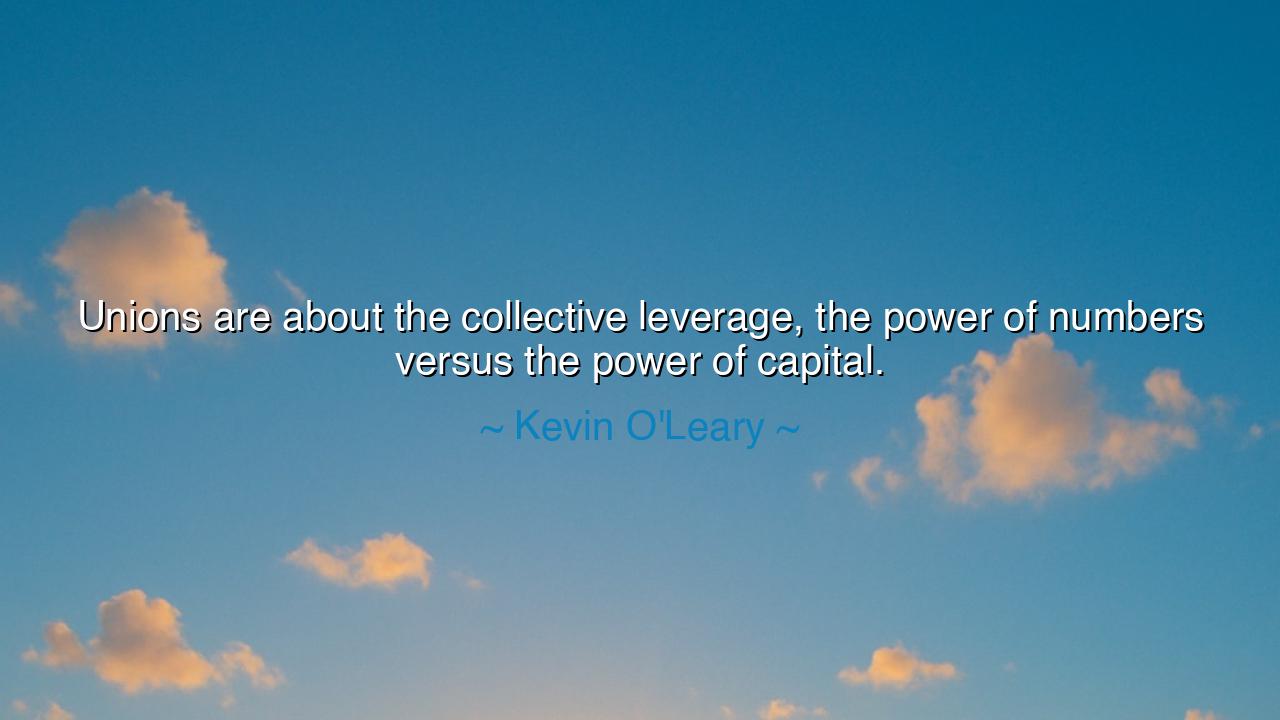
Unions are about the collective leverage, the power of numbers
Unions are about the collective leverage, the power of numbers versus the power of capital.






Kevin O’Leary, with the blunt clarity of a merchant of markets, speaks thus: “Unions are about the collective leverage, the power of numbers versus the power of capital.” In this saying he unveils a timeless conflict—the struggle between the many who labor and the few who hold wealth. Alone, the worker is weak; his voice scattered like dust in the wind. But united, bound in solidarity, the workers discover collective leverage, a strength forged not from gold but from shared resolve. Against the concentrated power of capital, they wield the might of numbers, and through unity transform frailty into force.
The ancients, too, understood this truth. In the Roman Republic, the plebeians, long oppressed by patrician lords, withdrew their labor in the famous Secession of the Plebs. Refusing to till the fields or serve in the legions, they forced concessions that birthed the office of the Tribune—a protector of the people’s rights. They did not triumph by sword or coin, but by the power of numbers, by the strength of solidarity against wealth and privilege.
History resounds again in the smoke and steel of the Industrial Revolution. In England and America, children toiled in mines, and men and women labored long hours for meager pay. Alone, they were helpless before the might of the factory owners. But when they bound themselves in unions, they gained a voice that no employer could ignore. Through strikes, marches, and unyielding persistence, they won shorter hours, safer workplaces, and the dignity of recognition. Their strength lay not in capital, but in the immovable mass of shared will.
Yet O’Leary’s words also hold a sober truth: that this struggle is eternal. Capital seeks always to grow, to consolidate, to bend labor to its will. But unions, when true to their calling, remind the world that wealth is barren without the hands that wield the plow, turn the wheel, and strike the hammer. It is the collective leverage of the workers that compels balance, forcing justice where unchecked wealth would devour.
Let the generations remember: power does not lie only in crowns, coffers, or corporations. There is a deeper power in the unity of the many, in the courage to stand shoulder to shoulder against injustice. The power of numbers versus the power of capital is not merely a battle of economics—it is the ancient contest of dignity against domination, of justice against greed. And wherever the humble unite, they carry the seed of victory, for solidarity is itself a form of greatness.






TTranbinhminh
It’s interesting that Kevin O’Leary, known for his capitalist stance, recognizes the legitimacy of union power. That makes me think about how both sides—labor and capital—actually need each other for a balanced system. But I’m curious, is the concept of collective leverage outdated in an age where automation and AI could replace human labor? What happens when the ‘numbers’ lose their bargaining strength altogether?
TKGia Thien Kieu
This statement feels like a reminder that power isn’t inherently good or bad—it just depends on how it’s used. Unions, at their best, give workers a voice; at their worst, they can become bureaucratic or political. I’d love to hear perspectives on how unions can stay relevant and ethical in the 21st century. How do they protect fairness without becoming part of the same power structures they resist?
TPThu Thao Pham
I like how straightforward this quote is—it strips away ideology and focuses on basic power dynamics. It makes me think about how economics is really about relationships, not just numbers. If workers don’t organize, capital naturally dominates. But I wonder why collective action is often portrayed negatively in modern media. Has society become too focused on individualism to appreciate the necessity of shared power?
ALLe An Lam
This perspective feels very pragmatic. It’s not romanticizing unions, just describing them as a counterbalance to concentrated capital. But it makes me question whether that balance still holds in an era where corporations are global and workers are local. Can national unions really challenge multinational power? Perhaps the next step is transnational labor organizing—where the ‘power of numbers’ extends across borders to match global capital.
KDKhanh Doan
I think this statement highlights something that’s often forgotten—the power of unity. It’s easy to talk about individual success, but history shows that real change often comes through collective action. Still, I’m curious: how do unions balance the need to protect workers while also keeping companies competitive? There’s always a fine line between empowerment and stagnation, especially when industries are under economic pressure.